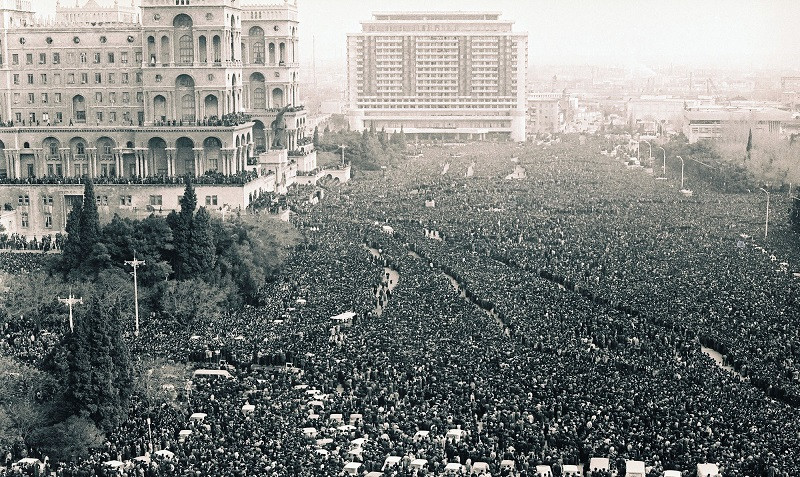Throughout history, along with numerous heroic events, the people of Azerbaijan have experienced tragedies. 20 January 1990, is one of the rare events that went down in Azerbaijan’s history as a day of sorrow and heroism. On that day, on the one hand, our people lost their lives, on the other hand, our bravest sons, not afraid of Soviet tanks and a hail of bullets, showed heroism and their desire for independence. From this point of view, the January 20 Tragedy should be considered the most important stage on our nation’s path to independence. Only after 20 January 1990, Azerbaijanis realized that it was no longer possible to stay under the rule of a state, or more precisely, in an empire, which took their lives and dishonored them. Let's take a brief look at the facts. The “reconstruction” policy initiated by Mikhail Gorbachev, who came to power in 1985, further deepened the political and socio-economic crisis in the Soviet Union and led to the escalation of national liberation and democratic movements in several Soviet republics in protest against this policy. As a result, Moscow resorted to excessive use of force to suppress these protests. The massacres and violence committed by the Soviet army against peaceful protesters in Tbilisi in 1989, in Baku in 1990 and in Vilnius in 1991 were aimed at preventing the collapse of a great empire. The violence and massacre in Baku stood out for its scale and consequences, as a result of which, more than 130 people were killed, 744 others were injured, and thousands of people were arrested or persecuted.
At that time, Moscow’s violence against the movement in Azerbaijan was not accidental. The national liberation movement that erupted in Azerbaijan in the late 1980s was considered to be strongest among those in other Soviet republics, and this fact greatly frightened Moscow. There were two main reasons behind the strongest protests in Azerbaijan: the first reason was the people’s desire to be independent, and the second one was related to the Karabakh conflict that arose due to Armenia’s territorial claims against Azerbaijan and the failure of the USSR leadership to play a fair role in resolving this conflict. After the dismissal of Heydar Aliyev, a member of the Political Bureau of the Central Committee of the Soviet Union's Communist Party and first deputy chairman of the USSR Council of Ministers, in October 1987, the so-called Nagorno-Karabakh problem was brought up to the agenda with the consent of Moscow again, and in February 1988, the Congress of People’s Deputies decided to take the Nagorno-Karabakh Autonomous Republic out of Azerbaijan and unit it with Armenia. This decision was aimed at the violation of Azerbaijan’s territorial integrity and the occupation of a part of its territories. All that happened, of course, strengthened the Azerbaijani people’s sense of protecting their land and increased distrust in the Soviet leadership. The 18-day-long movement that started in Baku’s Azadliq Square (Freedom Square) on 17 November 1988, the establishment of the People’s Front in 1989, and the strike actions that engulfed the republic were testimony to the fact that the national liberation movement in Azerbaijan has become an unstoppable process. This process resulted in the adoption of the first-ever constitutional law on sovereignty by the Supreme Soviet of the Azerbaijan SSR on 23 September 1989 among Soviet republics. It is worth mentioning one historical fact: Newsweek used a photo of one of the demonstrations in Baku as a cover for its 25 December 1989 issue headlined “Standing Up for Freedom. PEOPLE OF THE YEAR”.
Thus, the USSR leadership, which decided to use only military force to prevent the expanding national liberation movement in Azerbaijan, began deploying various types of troops to Baku after January 15. The deployment of various types of troops to Baku on the night of January 19 to 20 was based on the decree signed by USSR head Gorbachev on the introduction of a state of emergency in Baku, which constituted a gross violation of the relevant clauses of the Constitutions of the USSR and Azerbaijan, as well as international law. The main purpose of the acts of aggression and violence committed against Azerbaijanis by the decision of the USSR leadership on January 20 was to suppress the struggle of the Azerbaijani people for democracy and national liberation. However, contrary to expectations, the January 20 tragedy greatly strengthened the feeling of hatred against the empire and reinforced the Azerbaijani people’s determination for national freedom. Finally, all that happened led to the adoption of the Constitutional Act on Independence by Azerbaijan’s Supreme Soviet on 18 October 1991, which made the Azerbaijani people’s long-standing dream of independence come true.
Today, Azerbaijan is recognized as an independent, strong state that enjoys a growing reputation on a global scale, has managed to restore its territorial integrity and achieved successes in both foreign and domestic politics. For all our successes and our independence, which is our national wealth, first of all, we are indebted to the January 20 martyrs. May Allah have mercy on all our martyrs!
https://news.az/news/january-20-a-turning-point-on-azerbaijans-path-to-independence







